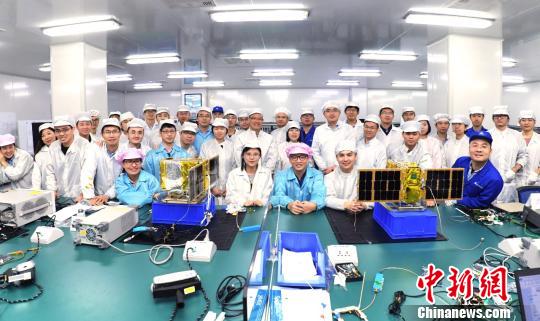


Spacety’s staff pose with their satellites (Photo/Chinanews.com)
Chinese private satellite companies are expanding their market share by tapping potential in multiple areas, The Beijing News reported on Oct. 30.
Spacety, a private satellite company, which positions itself as a satellite mini-lab that helps people conquer space, said it plans to launch more than 10 small satellites into space this year.
The company successfully sent its four self-developed satellites into space using a Long March 2C rocket on Oct. 29, its second mission this year.
Spacety’s revenue is expected to reach 60 million yuan this year, growing three-fold since last year, said its CEO, Yang Feng, adding that his company will expand its business beyond remote sensing and communication as the next step.
Commsat, a Beijing-based private satellite company, will launch its Ladybeetle satellites into space by the end of this year, with the aim of authenticating the Internet of Things system.
The private companies said they could cultivate their advantages in multiple areas such as remote sensing, communication, and scientific research. They’ve also prepared differentiated marketing strategies to avoid competition with state-owned satellite companies.
Microsatellites have become a new business area for private companies, driven by military-civilian integration, and the fact that nowadays it takes much less money to produce and launch a satellite.
Yang said the company is cooperating with state-owned satellite companies to finish their orders, mainly in the manufacturing of scientific research satellites.
The satellite companies are teaming up with online marketplaces on the latter’s consumer services. For instance, Alibaba and Suning will use satellites to communicate with their customers on the eve of the Double 11 shopping spree.
 Fire brigade in Shanghai holds group wedding
Fire brigade in Shanghai holds group wedding Tourists enjoy ice sculptures in Datan Town, north China
Tourists enjoy ice sculptures in Datan Town, north China Sunset scenery of Dayan Pagoda in Xi'an
Sunset scenery of Dayan Pagoda in Xi'an Tourists have fun at scenic spot in Nanlong Town, NW China
Tourists have fun at scenic spot in Nanlong Town, NW China Harbin attracts tourists by making best use of ice in winter
Harbin attracts tourists by making best use of ice in winter In pics: FIS Alpine Ski Women's World Cup Slalom
In pics: FIS Alpine Ski Women's World Cup Slalom Black-necked cranes rest at reservoir in Lhunzhub County, Lhasa
Black-necked cranes rest at reservoir in Lhunzhub County, Lhasa China's FAST telescope will be available to foreign scientists in April
China's FAST telescope will be available to foreign scientists in April "She power" plays indispensable role in poverty alleviation
"She power" plays indispensable role in poverty alleviation Top 10 world news events of People's Daily in 2020
Top 10 world news events of People's Daily in 2020 Top 10 China news events of People's Daily in 2020
Top 10 China news events of People's Daily in 2020 Top 10 media buzzwords of 2020
Top 10 media buzzwords of 2020 Year-ender:10 major tourism stories of 2020
Year-ender:10 major tourism stories of 2020 No interference in Venezuelan issues
No interference in Venezuelan issues
 Biz prepares for trade spat
Biz prepares for trade spat
 Broadcasting Continent
Broadcasting Continent Australia wins Chinese CEOs as US loses
Australia wins Chinese CEOs as US loses